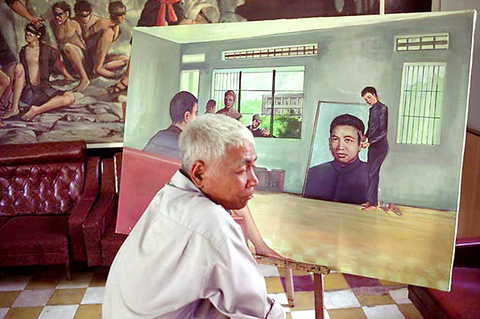When Cambodia recently staged a national film festival, serious drama was in gruesomely short supply: almost half the entries were low-budget horror flicks.
It wasn't always thus.
In the 1960s, now-retired King Norodom Sihanouk was not only the patron of a Cambodian film industry, he was one of its most active practitioners. He wrote, directed and even acted in his own high-minded if formulaic romances and tragedies.

PHOTOS COURTESY OF FOX MOVIES
More than 300 Cambodian films were made during that vibrant era, some well-received in other Asian countries.
But when the communist, puritanical Khmer Rouge regime came to power in the mid-1970s it banned all kinds of entertainment and smashed cameras and film-making equipment.
As the country's spirit began to recover from the Khmer Rouge era, and economic revival took hold in the early 1990s, the industry began to rebound. More than 100 production houses sprang up, mostly using video equipment to churn out movies on a shoestring.
But most of them collapsed because of their amateurism, and the industry is still struggling to recover its former glory.
These days, about five movie making companies have the expertise and strong finances to succeed, said Chheng Sovanna, head of the Culture Ministry's movie production office.
``Most of them are accidental producers, who just spent US$3,000 on a camera, bought some tapes, turned on the light and started shooting,'' said Chheng Sovanna, himself a director who graduated from Russia's State Institute of Cinematography. ``We don't understand the way they make movies.''
And the filmmakers lean more toward anarchy than artistry on screen.
At the recent festival, a typical movie featured a female vampire baring her canine teeth in a grin as she looked for prey. In Nieng Arp, or Lady Vampire, a flying female head with internal organs dangling beneath it chased a terrified couple in the dark.
Nine of the festival's 22 entries were in a similar vein.
``We make movies to suit the domestic market and the demand of our youths,'' said Korm Chanthy, the manager of FCI Productions, which made Nieng Arp.
``They like to watch horror movies because they make them feel excited, thrilled and terrified,'' he said.
The government wasn't impressed. The filmmakers ``injected too much hallucination and superstition'' into their work, complained Culture Minister Prince Sisowath Panara Sirivuth.
``Their understanding of moviemaking is that it's just business,'' he said. ``And they have this misperception that, without training, they can still make movies.''
The government has touted the idea of establishing a film school, but in a country so poor and reliant on foreign aid as Cambodia the idea is unlikely to get off the ground anytime soon.
Producer, 29-year-old Heng Tola, was looking to diversify his computer business when he founded Campro three years ago with several friends.
Making a movie takes Campro about three months and costs an average of US$30,000, including about US$1,000 for the lead actor, he said.
Despite the current taste for horror movies, Heng Tola believes a more serious trend is emerging, prompted in part by the resentment many Cambodians feel about its colonial past and toward domineering neighbors such as Thailand and Vietnam.
One of the festival entries was a nationalistic epic about a peasant protest against high tax imposed by Cambodia's colonial rulers, the French.
``The Cambodian movie is being reborn after a long absence. Its existence has been up and down, and the question now is how we can make it really stand,'' Heng Tola said.

Jan. 26 to Feb. 1 Nearly 90 years after it was last recorded, the Basay language was taught in a classroom for the first time in September last year. Over the following three months, students learned its sounds along with the customs and folktales of the Ketagalan people, who once spoke it across northern Taiwan. Although each Ketagalan settlement had its own language, Basay functioned as a common trade language. By the late 19th century, it had largely fallen out of daily use as speakers shifted to Hoklo (commonly known as Taiwanese), surviving only in fragments remembered by the elderly. In

William Liu (劉家君) moved to Kaohsiung from Nantou to live with his boyfriend Reg Hong (洪嘉佑). “In Nantou, people do not support gay rights at all and never even talk about it. Living here made me optimistic and made me realize how much I can express myself,” Liu tells the Taipei Times. Hong and his friend Cony Hsieh (謝昀希) are both active in several LGBT groups and organizations in Kaohsiung. They were among the people behind the city’s 16th Pride event in November last year, which gathered over 35,000 people. Along with others, they clearly see Kaohsiung as the nexus of LGBT rights.

Dissident artist Ai Weiwei’s (艾未未) famous return to the People’s Republic of China (PRC) has been overshadowed by the astonishing news of the latest arrests of senior military figures for “corruption,” but it is an interesting piece of news in its own right, though more for what Ai does not understand than for what he does. Ai simply lacks the reflective understanding that the loneliness and isolation he imagines are “European” are simply the joys of life as an expat. That goes both ways: “I love Taiwan!” say many still wet-behind-the-ears expats here, not realizing what they love is being an

In the American west, “it is said, water flows upwards towards money,” wrote Marc Reisner in one of the most compelling books on public policy ever written, Cadillac Desert. As Americans failed to overcome the West’s water scarcity with hard work and private capital, the Federal government came to the rescue. As Reisner describes: “the American West quietly became the first and most durable example of the modern welfare state.” In Taiwan, the money toward which water flows upwards is the high tech industry, particularly the chip powerhouse Taiwan Semiconductor Manufacturing Co (TSMC, 台積電). Typically articles on TSMC’s water demand